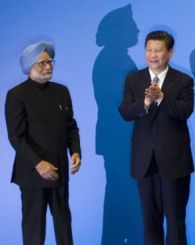Both India and China have realised that if border incursions keep reoccurring, other issues of mutual interest will remain unstable. Sheela Bhatt reports
 Prime Minister Manmohan Singh is likely to approach China politically. It is the Indian civilian leadership that will take a call on its next move in relation with China, says a source in the government well-versed with the PM's forthcoming visit to China.
Prime Minister Manmohan Singh is likely to approach China politically. It is the Indian civilian leadership that will take a call on its next move in relation with China, says a source in the government well-versed with the PM's forthcoming visit to China.
After his two-day visit to Moscow, Dr Singh will be visiting China on October 22 and 23. The prime minister will hold high-level talks with President Xi Jinping and Premier Li Keqiang.
While elaborating India’s approach to Beijing, the high-level source in the government said, “Since the last few years the Indian civilian leadership is quite realistic in its relation with China. The media has played its role to make things more transparent while raising issues at a high pitch.”
“India is being pragmatic with China than ever before. Prime Minister Singh’s visit will be a good visit but it’s no more about bhai-bhai. We are pragmatic and seeing everything on a long term basis,” the source added.
A realistic approach would mean there is an element of uncertainty in India's relation with China, but India can't wish them away. India and China will have to learn to live with each other.
The Indian government has dismissed the use of the word threat to describe any of China’s actions. But at same time, India’s calibrated move talks about it.
“There are no threats right now but we can't claim that the situation cannot alter. We have to trust but verify,” he said.
The Indian side does not see a solution to the border issue in the near future, but as one senior government functionary said, “It doesn't mean there is no solution to the border issue.”
“We understand our majburis, our pareshanis (limitations and concerns). We now know intrinsic complexities between us (the two countries) better. The media has brought India-China relationship in the open,” the source added.
The highlight of the prime minister’s visit will be the signing of the Border Defence Co-operation Agreement. Though not confirmed yet, it is possible that Dr Singh would visit the Forbidden City, the heritage site built in 1420 by the Ming dynasty in the outskirts of Beijing. It is yet to be seen if the prime minister will be accompanied by China’s high-profile leadership if and when he goes sightseeing.
The former Premier Wen Jiabao, with whom Prime Minister Manmohan Singh struck a chord during his many cordial visits, may even host a special lunch for Dr Singh.
So far, the Chinese have shown interest in building the right atmospherics and given Dr Singh a warm welcome.
The Chinese ministry informed that Dr Singh will address China's ruling Communist Party's CentralSchool on October 24, which is considered a rare honour.
The idea of a Border Defence Cooperation Agreement originated from the Chinese side early this year but was finalised after mutual consultations over a few months.
India has been able to modify the Chinese draft. For instance, China wanted the withdrawal of troops in certain sectors but India hasn’t agreed to it. China wanted to freeze military movements in the border areas, but due to uneven progress of infrastructure at the borders, India disagreed.
The prime minister’s last bilateral visit to Beijing was in January 2008 (he attended BRICS in Sanya in 2011). A lot has happened between the two countries in-between years.
Both sides have seen some incursions on the border, which is not well-defined. India is feeling a pinch due to trade imbalance where India’s exports is $30 billion more than Chinese import from India, which is lagging behind due to reduction in India’s export of iron ore.
China’s growing clout in India’s neighbourhood is another issue that has made both sides edgy. The Indian government has decided to form a mountain strike corps to guard its border with China. The most complex of all issues is the unsettled border issue. Both sides have realised that if border incursions keep reoccurring, other issues of mutual interest will remain unstable.
In the last six years, the issue of stapled visas to Indians from Jammu and Kashmir and Arunachal Pradesh has also caused bitterness in New Delhi. The shadow of all these complex issues will extend to Beijing when Dr Singh meets Premier Li.
India will know only after the visit if the Chinese are politically inclined to build a relation of mutual trust under its new leadership, says the high-level source in the government.
When asked about the BDCA, the source said it will make the India-China border stable.
Professor Srikanth Kondapalli, India’s foremost China expert says, “The BDCA is incremental on the agreement between India and China on Confidence-Building Measures in the military field along the Line of Actual Control in the India-China Border Areas.”
The agreement had 12 articles and it clarified procedures to be adopted in case of incursions and tensions at the border. Once again in 2013, the Indian prime minister’s visit to Beijing will divert both the countries attention to the 4,000 km unsettled border.
Image: Prime Minister Manmohan Singh and Chinese President Xi Jinping at the BRICS Summit in Durban, South Africa
Photographs: Reuters












 © 2025
© 2025